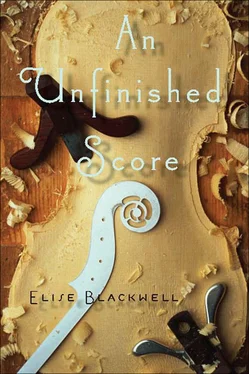Petra wraps herself with her arms and rocks back and forth intensely. “I know what,” she says. “You decide. You’re so good at deciding everything — you decide. I’m leaving it up to you.”
Suzanne feels her anger rise as heat into her face, the tops of her ears growing warm. She tries hard, all the time, to help Petra as much as possible without ever tricking herself that she is a parent, that Adele is hers, that she has the right to decide anything important. Especially in this she has kept a studious distance, even when it wasn’t easy, trying not to even have an opinion. Yes, she’s gathered information and listened, but she never allows herself, even for a moment, to forget that Petra is Adele’s mother and she is not.
Before Petra’s frantic phone call when she realized that Adele could not hear, Suzanne had not given much thought to the ear. When musicians speak of the ear, they mean little more than the ability to identify or produce pitch, tempo, and dynamic. Like everyone else, they complain that their ears are too large or too small, that they stick out or lie strangely flat; as teenagers, they pierce them thoughtlessly. Rarely do they contemplate the ear as their most fundamental organ, their talent, tool of their trade.
Petra’s call was followed by others as the doctors, including specialists Petra could not afford, debated the type and cause of Adele’s deafness. From a helpless distance, Suzanne looked at drawings of the ear. She learned the beautiful names of its parts. Visible to the eye are the helix, the antihelical fold, the tragus dipping over the external auditory canal. Deeper, past the secret passage of the tympanic membrane, through the drum, sit like atolls the malleus, the incus, and the stapes. So gorgeous and intricate is the ear that it is miraculous that anyone hears at all. For most of those who do not, she learned, it is not that the ear shuts to sound but that, for various reasons and reasons that often remain unknown, the deaf person does not translate the acoustic energy of sound into the electrical signals carried to the brain by the thirty thousand fibers of the auditory nerve. That is the nature of Adele’s deafness, and no doctor could explain why except to say that the four parallel rows of hair cells in each of her ears were incomplete or had deteriorated. A tiny imperfection with profound consequences.
“Could it be something she took?” Ben once asked.
Suzanne yelled back at him that no, Petra had not cost her daughter her hearing. “She took nothing, drank nothing, breathed nothing noxious. She avoided cats and people who coughed. She washed her hands.” By the time she said hands she was crying. Suzanne knew, even as she was doing it, that she was defending not Petra but herself. Surely Ben had noticed his mother and sister commenting about her exercising while she was pregnant, about what she ate, about the half cup of morning coffee. “Everyone wants to blame the mother,” she finished, but Ben was already walking away, his response to almost every fight, his response to most of her strong emotions.
Sometimes after talking to Petra Suzanne dreamed of riding a raft through the turns of the ear. She asked every musician she knew whether they knew that the basilar membrane running the height of the cochlea distributes vibrational energy longitudinally and by frequency. Only one person she asked had known this before she told him, and that was Ben. Ben was the only musician she talked to who had thought seriously about hearing, considered the ear in composing. At Curtis he composed a piece that alternated the lowest frequencies that cause the most vibration at the apex of the cochlea and those very high frequencies that cause the most vibration at the cochlea’s base. He called the series of movements “Ear Dances.” Just before they moved to Princeton, Suzanne dug through every box in their garage, but she could not find the composition.
“We’re talking about Petra, not you,” Ben said when she asked him if he knew where it was. “Don’t turn into one of those women who go daffy on their dogs when they don’t have a baby.”
“Adele is not a dog,” she said, but as is common with the most cutting of remarks, she not only hated him for its cruelty but believed in its accuracy.
Suzanne sometimes thinks that if Ben had not said that single sentence she would have forgiven everything else, endured the emotional distance that was there from the beginning, stayed more or less happily married, resisted Alex’s gaze. Other times she thinks the two events are unrelated, that she couldn’t have refused Alex even if she had been happy, that she would have fallen in love with him in any circumstance. Nothing breaks cleanly. Sometimes she thinks her marriage ended the day she met Alex, but it’s also true that her marriage never ended but goes on and on, that she is married still.
And now she hopes that her loss — her mother, her child, her lover — protects her from more loss, the way she hopes Adele’s deafness protects her from premature illness. Dues already paid . But she knows this is a false superstition. Everyone who reads the news knows that life can take everything from you. Some people lose one child in a flood or famine; others loose all six plus everyone else they’ve ever known. Luck doesn’t spread evenly, not good luck and not bad.
“Petra?” she says. “What’s the name of that composer for recorder? Seventeenth century?”
Petra smiles. “Oh, yeah, from that awful tutorial.”
“Remember, he grew rich as a bell tuner? He traveled everywhere because he had a special feel for them, for that shape.”
“The bell whisperer,” Petra laughs. “So, okay, let’s go see the kids and the bells. And yes, I know I’m a bitch.”
Suzanne puts her arm around her friend’s square shoulders. “You’re scared.”
“I am scared.” Petra still smiles but also swipes her eyes. “But let’s do this. I want to see.”
Inside the other wing of the children’s hospital they follow the information boards and signs to the fourth floor, then down a gleaming hallway that does not smell like hospitals usually smell but instead has the neutral odor of an office building.
The door they seek is open, and they stand wedged together in its threshold, watching a small circle of children made blind with plush black eye covers. They respond with push buttons to chimes played by a woman in a lab coat. The children range in age from maybe three to nearly adolescent. When they remove their blindfolds, the woman turns. She’s in her forties, blond and elegant with stern features calmed by an ample smile. She smoothes her already sleek hair with her hand and then extends that hand to Petra, saying her name as a question.
The children zip backpacks, collect belongings, make their way to the door in pairs and small groups as Suzanne and Petra stand aside for them. Some say good-bye to Dr. Ormand; of these, some sound almost like hearing children while others speak with the exaggerated roundness of the deaf, of those who have learned to speak by shape and not by sound, who have learned to speak with other people’s fingers on their mouths. One boy, about Adele’s size, walks alone. He is humming, carrying the simple tune well, and grinning.
Suzanne nods. “Can they hear the chimes?”
The doctor motions them into the room, and they sit at the table where the children were being tested. “I’ll have to tabulate their answers to tell you about this group today, but the answer is yes. Pretty much. They can perceive the sounds. It takes work and therapy — a lot of it — but within a few months of implantation all of these children could correctly identify whether a chime is sounded or not. Most of them can accurately identify differences in volume, if those differences are substantial. They can’t distinguish differences as subtle as those described by the Weber-Fechner or Powers Law, but they can distinguish loud from soft.”
Читать дальше












